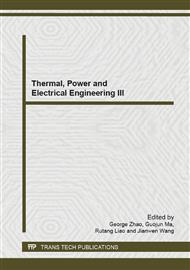p.1104
p.1108
p.1112
p.1116
p.1120
p.1124
p.1128
p.1134
p.1142
Research of Power Flow Distribution Evenness Based on Entropy
Abstract:
Research of power flow evenness has great significance for grid steady state analysis. This paper researched for a method for power flow evenness analysis through entropy theory. According to current power flow distribution and branch power limits, the branch load ratio distribution could be obtained, and the power flow entropy was calculated based on discrete information entropy theory. The study case indicates that the power flow entropy effectively describes the power flow evenness. With certain system load level, the system security level will be dramatically declined when power flow evenness reduces to a certain level, which is demonstrated in the case meanwhile. Power flow evenness analysis based on entropy theory is applicable in power system static security assessment.
Info:
Periodical:
Pages:
1120-1123
Citation:
Online since:
June 2014
Authors:
Price:
Сopyright:
© 2014 Trans Tech Publications Ltd. All Rights Reserved
Share:
Citation:


